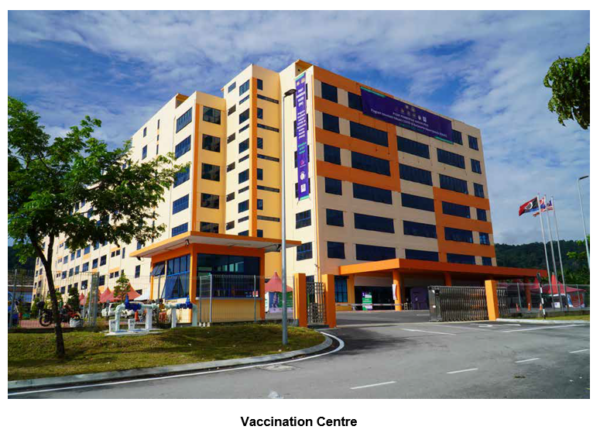Textile manufacturing conglomerate introduces projects in eorts to embrace movement in line with 12MP
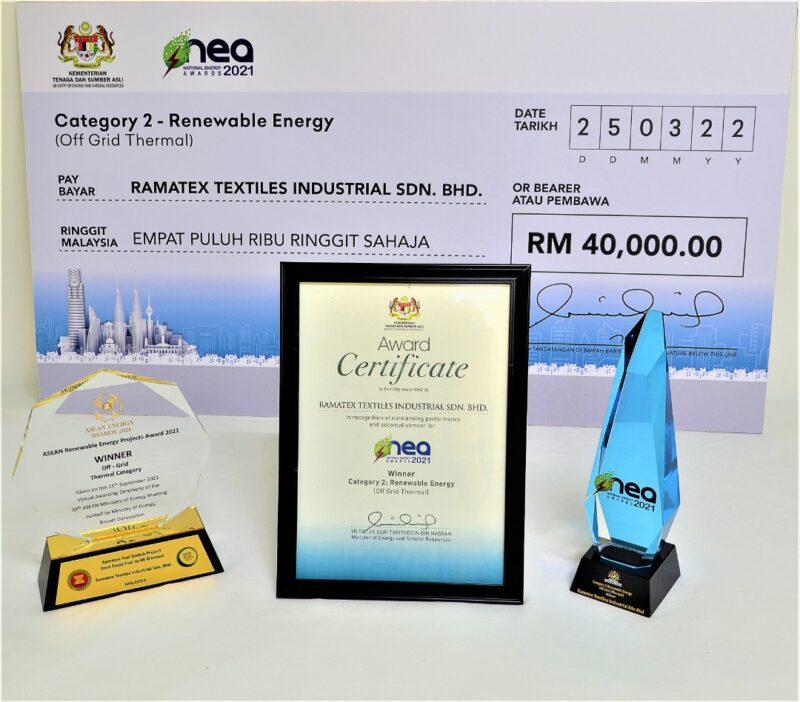
This site
is mobile
responsive
The COVID-19 pandemic has raised the pressure on businesses to adapt and become more resilient in the face of adversity; where they face an increasing need for flexibility and creativity to achieve long-term sustainability as well as being prepared for future risks. In identifying risks and taking advantage of opportunities, many businesses are factoring environmental, social, and governance (ESG) strategies into their operations, to strike a balance between environmental sustainability, socio-economic development, and organisational policy.
Fortuitously, this adoption of ESG is in line with the objectives of the Twelfth Malaysia Plan, 2021-2025 (12MP) – specifically, pertaining to Chapter 8 (Advancing Green Growth for Sustainability and Resilience) and Chapter 9 (Enhancing Energy Sustainability and Transforming the Water Sector). 12MP highlights Malaysia’s commitment to becoming a net-zero carbon emission country by 2050. The importance of adopting a sustainable circular economy has been reinforced and will be implemented by integrating the 17 United Nations Sustainable Development Goals (UN SDGs), and ESG principles into the decision-making processes.
Having said that, while the pandemic has pushed ESG practices into the spotlight, the movement itself and its implementation is not new in Malaysia, as demonstrated by Ramatex Textiles Industrial Sdn. Bhd. (Ramatex Textiles), a textile manufacturing company located in Batu Pahat, Johor that has been adopting ESG principles since 2011.
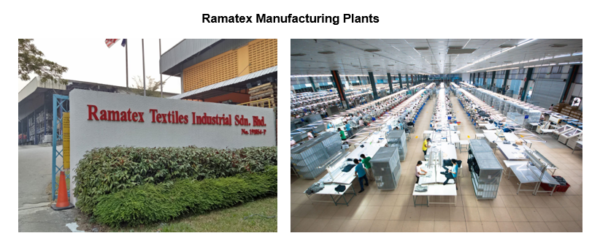
From Humble Beginnings to Exporting Globally
Ramatex Textiles is one of the subsidiaries of Ramatex Group (Ramatex) which started its business with a knitting factory in 1976 in Singapore. In 1983, the company went on to establish a business in Parit Raja, Johor by renting three units of a three-storey shop lot with only three knitting machines. They achieved their next milestone in 1990 with the establishment of both Ramatex Textiles (as a textile manufacturer), and Gimmill Industrial (M) Sdn. Bhd. (Gimmill, as a garment manufacturer) in Batu Pahat, Johor.
Today, Ramatex has successfully expanded to become a vertically integrated business that covers textile manufacturing (spinning, knitting, dyeing, printing, and finishing) and made-up garments for export markets including the USA, the European Union (EU), Canada, Australia, New Zealand, China, Japan, Jordan, and ASEAN countries (Thailand, Cambodia, and Vietnam).
It is one of the key global supply chain providers of textile and garment manufacturing for international brands such as NIKE, Under Armour, and Fast Retailing (GU and Uniqlo). Over the past 10 years, Ramatex Textiles has increased its turnover from RM350 million in 2010 to RM1.2 billion in 2020, in addition to creating employment opportunities from 1,800 workers in 2010 to 3,700 workers in 2021.
ESG From the Root: Responsible Raw Material Sourcing
In line with 12MP, Ramatex has introduced several projects in its efforts to embrace ESG for the development of sustainable manufacturing and eco-innovation. Driven by the goal of environmental sustainability, the textile yarn manufacturer uses raw materials that are made from organic cotton, recycled waste, or a mix of both for its finished products.
Under the Responsible Sourcing Network (RSN) programme, the purchase of raw cotton is certified by the Better Cotton Initiative as part of efforts to help cotton farming communities survive and thrive while protecting and restoring the environment. One of RSN’s most important initiatives is Yarn Ethically & Sustainably Sourced (YESS), which aims to examine and eliminate modern slavery from the cotton production and apparel supply chain.
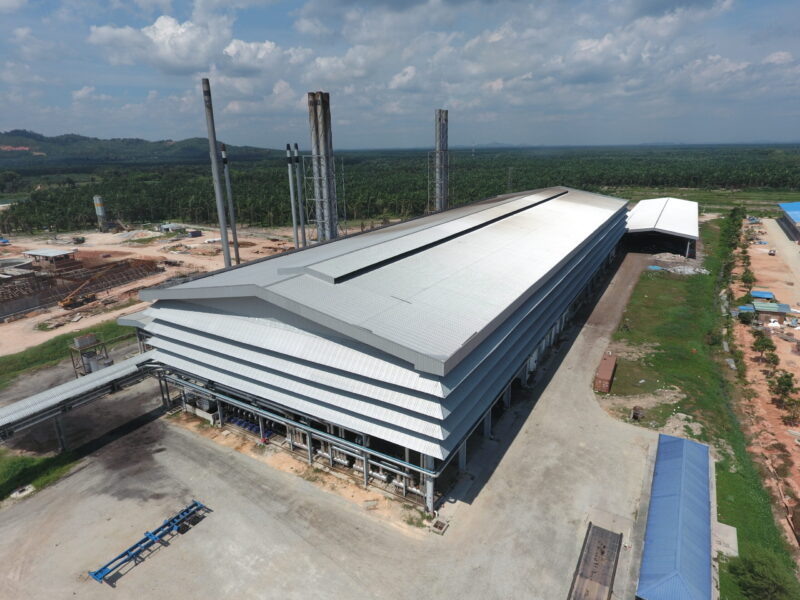
Ramatex is recognised as YESS-aligned, as the company strives to only purchase cotton materials from sources that have been verified and are not involved in unethical cotton production practices. In addition, Ramatex is also certified by the Control Union with the Certification of Organic Content Standard, an international, voluntary standard that sets requirements for third party certification of certified organic input and chain of custody to increase organic agriculture production.
Focus on Recycled Textiles and Biomass
Other ESG initiatives by Ramatex include using raw materials from recycled textile waste such as recycled cotton, recycled polyester, PET chips, and fabric waste. Recycled textile waste can be generally defined as converting any waste into recycled products that can be reused in the manufacturing of textile products. This reuse helps to minimise the usage of new raw materials and
reduces unnecessary waste generation to the environment, in line with Ramatex’s circular economy investment plans.
The company also aims to increase its buyers’ global sourcing of sustainable manufacturing, and has planned a major investment worth RM450 million by 2025. This is expected to contribute towards making Malaysia an eco-textiles and apparel manufacturing hub in Southeast Asia.
In line with improving and certifying its products, Ramatex places great emphasis on the utilities and services used in its production processes and their impact on the society and environment. In 2011,
Ramatex invested RM100 million in a biomass project (Phase 1) as a total replacement for fossil fuels (coal and fuel oil) used in the production. This project has produced steam with approximately 958.7207 terajoules of thermal energy per annum, and targets to replace 22.9 million litres per year of fuel oil consumption. The biomass project helps to reduce adverse impact on the environment and achieve significant reduction of greenhouse gas of 74,204.98 total carbon dioxide (tCO2) per year.
This biomass installation project and consumption resulted in a 39.43 per cent internal rate of return with the investment being fully regained within a mere two years. The energy cost savings on fuel is about RM39.4 million annually from switching fossil fuels to biomass. The ash by products from the combustion of biomass are sold to a third party to reprocess as raw materials for biofertiliser in the agriculture industry.
To combat the dust emissions polluting the environment caused by the burning of biomass waste, Ramatex installed an Air Pollution Control System which produces a quarterly Chimney Gas Emission Monitoring Report as their sustainability initiative.
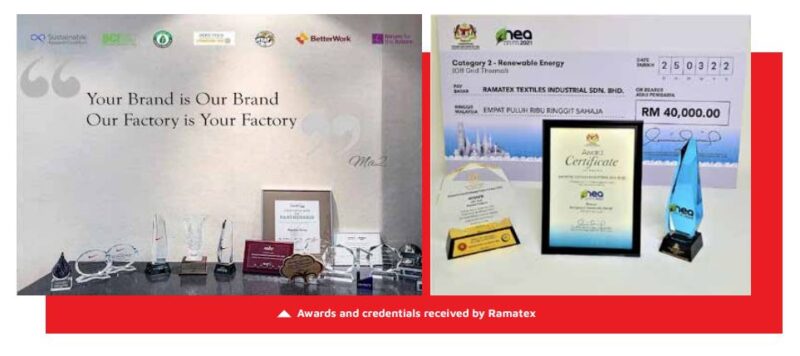
Industry Recognition and Awards
Notably, in 2021, the Ministry of Energy and Natural Resources announced Ramatex as the winner of the National Energy Awards 2021 under Category 2 Renewable Energy Off Grid (Thermal) and winner of ASEAN Energy Awards (AEA 2021) by ASEAN Centre of Energy under Renewable Energy Off Grid Category (Thermal).
Energy Efficient Efforts
Ramatex has reengineered its manufacturing process by installing Energy Efficient (EE) equipment that reduced its electricity usage by 53.74 per cent – equivalent to a reduction of 34,235.147 megawatt hours (MWh), and saving the company RM13 million per year. Ramatex has also started to use natural gas, investing RM22 million in a biomass steam boiler to enhance the energy efficiency of steam production for the textiles dyeing and finishing process. The EE project will be enhanced with the installation of a co-generation (cogen) with a capacity of 9,330 kilowatt-electric (kWe) per hour, 25.6 metric tonnes of steam per hour, and 75.2 metric tonnes of hot water per hour for its existing production lines, all of which is estimated to reduce up to 18,000 tonnes of carbon dioxide emissions per year.
When it comes to managing water usage, the company has introduced a zero-discharge policy by
investing RM250 million in a wastewater treatment plan. This system collects or harvests all water streams, from the Industrial Effluent Treatment System, rainwater and domestic wastewater into one centralised collection pond system before being treated with a Reverse Osmosis System. The wastewater treatment plant has been recognised as a World Class Industrial Wastewater Recycling System and ranked first in Nike’s Global Water Programme.
Ramatex is targeting to use 60 per cent of renewable energy (RE) by 2030, in order to fulfill its goal of being a future-ready sustainability manufacturing plant that facilitates ESG practices. The company plans to install solar systems with a total capacity of 39 MW for six Batu Pahat factories which will generate up to 49,727 MW per year of green energy; this will reduce an equivalent of 31,776 tonnes of carbon dioxide emissions in the first year, and more than 635,520 tonnes of carbon dioxide over the next 20 years. This solar system is also expected to reduce the company’s electricity bills by up to RM17 million per annum, thus contributing to a lowering of its carbon emission footprint.
Commitment to CSR
Additionally, Ramatex has emphasised the importance of the welfare of its employees by frequently launching Corporate Social Responsibility (CSR) Programmes. The company provides spacious dormitories – a total of 43 blocks of hostels as at 2021 – for employees who are working away from their home countries, and ensures that all workers live in a healthy and comfortable environment.
Ramatex also provides training and awareness programmes to various parties, including their stakeholders such as ministries, government agencies (MITI/ MIDA/ MATRADE/ Plan Malaysia/ DOE/ Local Authorities), academic institutions (YPHS/ School of Design and Media/ MATAC), and business communities (MTMA/ ACCIMBP/ MKMA), to create awareness, share knowledge, and technical know-how on all aspects of the textile industry.
During the pandemic in 2020, Ramatex donated 2.49 million pieces of disposable masks and 483,200 pieces of reusable face masks to all schools in Batu Pahat, Johor. The company also set up a Vaccination Centre, namely the PPV in Ramatex Batu Pahat under the Public-Private Partnership Industrial COVID-19 Immunisation Programme (PIKAS) for employees, and all industries within Batu Pahat, Kluang and Muar in Johor with 30,000 vaccine recipients (VR doses 1 and 2).
Additionally, Ramatex also prepared the National COVID-19 Immunisation Programme for 10,000 secondary and primary school students to speed up the national goal of achieving herd immunity. In both programmes, all the venues and facilities were provided by Ramatex without any charge.
With high technology advancement, increasing social awareness, and growing commitments to robust development strategies in green technology, Malaysian companies such as Ramatex gives a clear indication that ESG adoption is the way forward to achieving the country’s green goals.
MIDA continues to welcome strategic investments and collaborations in the green technology industry to further strengthen Malaysia’s green ecosystem, and concurrently build climate resilience, reduce global emissions by 45 per cent by 2030 and achieve net zero emissions by 2050.
